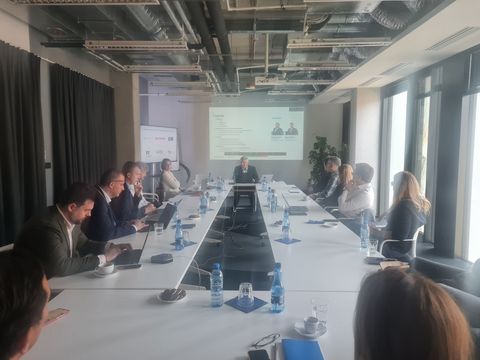Summary of the CCIFP Rebuilding Ukraine working group meeting on legislative changes to stimulate business development in Ukraine

The CCIFP's Rebuilding Ukraine working group opened its series of post-summer meetings with a presentation on legislative changes to stimulate business development in Ukraine and protection of investors' rights. The meeting, which took place on 11 October, was chaired by Andrzej Mikosz, Partner at Taylor Wessing in Warsaw.
The introduction to the meeting concerned the general situation in Ukraine in the context of the ongoing hostilities and current demographic and economic data. The Ukrainian economy shows admirable resilience and the economic prospects for the country look good. The inflation rate has fallen and Hryvna has strengthened in the past few months against the main currencies, illustrated by most recent decision of the NBU to cast aside the administrative (fixed) UAH exchange rate to foreign currencies and to resume their supporting interventions policy. The construction companies and trading companies report a positive (>50%) outlook for the coming months. The industrial sector shows positive trends (the outlook for growth has improved from 48.8% to 50%). The only negative outlook is represented by the services’ sector, however it has also improved on the previous survey (47.9% from 47.3% in August).
We raised the subject of special legislation brought in by war with regard to State Registers and war time FX and capital flow regulations. We also discussed the implementation of acquis communautaire : Ukraine has gradually approximated to substantial elements of the EU acquis across many chapters.
The subject of our discussion was also the judiciary: the reform of the entire judiciary branch is one of the key elements in the process of integration with the EU. We also focused on peculiarities of the Ukrainian system, by comparing public and private bailiffs. The process to reform the Ukrainian system of enforcement of judicial decisions is still not finalized while the issue of enforcement of judicial and administrative decisions is being considered by the EU one of the most challenging and demanding issues in the entire process of harmonization of Ukrainian law with EU requirements.
We raised the issue of Bilateral Investment Treaties freedom of flow of capital. Ukraine has 76 Bilateral Investment Treaties in force, with other countries and with OPEC. The EU proposed regulation and instruments regarding financing of the reconstruction of Ukraine do not contain specific provisions regarding dispute resolution; including issues of investment disputes. That provides for the BIT protection and Washington Convention to be the basis of legal protection of investment also in an activity connected with use of the EU funds under the EU Ukrainian reconstruction facility. The risks in the context of the decision to invest in Ukraine is the limited access to commercially and legally material information. It is possible to access via internet to: Register of Legal Entities and Real Estate Register containing records on proprietary rights and encumbrances of the Real Property in Ukraine. The both are administered by the Ministry of Justice. As at today, despite fierce public criticism, the registers have not been made publicly available. The low level of completeness of the Register of Rights on Real Property may become a major risk issue in the future reconstruction of Ukraine with special emphasis to the Eastern part of the Country.
We would like to thank Andrzej Mikosz from Taylor Wessing for his thorough presentation of the legal situation in terms of the activities of business entities in Ukraine. We also thank the members of the group for their active participation.